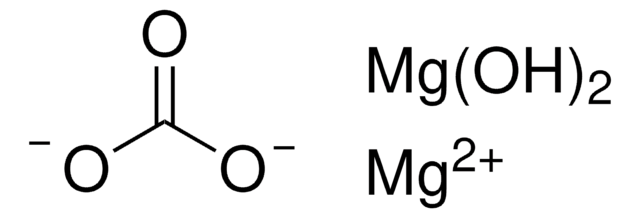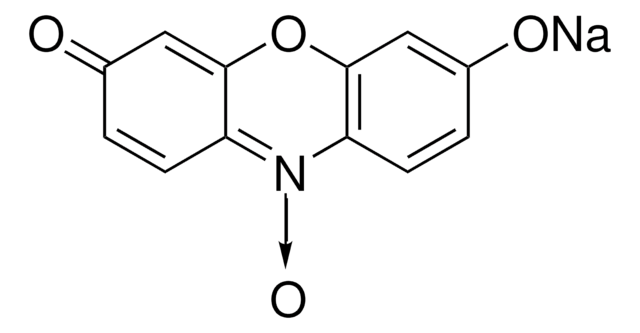Wszystkie zdjęcia(2)
Key Documents
M7179
Magnesium carbonate
meets USP testing specifications
Synonim(y):
Magnesium carbonate hydrate
Zaloguj sięWyświetlanie cen organizacyjnych i kontraktowych
About This Item
Wzór liniowy:
MgCO3 · x H2O
Numer CAS:
Masa cząsteczkowa:
84.31 (anhydrous basis)
Numer MDL:
Kod UNSPSC:
51171508
Identyfikator substancji w PubChem:
NACRES:
NA.21
Polecane produkty
agency
USP/NF
meets USP testing specifications
Poziom jakości
stężenie
40.0-43.5% (Mg (as MgO))
Zastosowanie
pharmaceutical (small molecule)
ciąg SMILES
O.[Mg++].[O-]C([O-])=O
InChI
1S/CH2O3.Mg.H2O/c2-1(3)4;;/h(H2,2,3,4);;1H2/q;+2;/p-2
Klucz InChI
OUHCLAKJJGMPSW-UHFFFAOYSA-L
Szukasz podobnych produktów? Odwiedź Przewodnik dotyczący porównywania produktów
Zastosowanie
- Growth, secondary metabolite production, and in vitro antiplasmodial activity of Sonchus arvensis L. callus under dolomite [CaMg(CO3)2] treatment.: This research investigates the effect of dolomite, containing magnesium carbonate, on the growth and biochemical profile of Sonchus arvensis L. callus cultures, highlighting its potential for enhancing bioactive compound production (Wahyuni et al., 2021).
This page may contain text that has been machine translated.
Kod klasy składowania
11 - Combustible Solids
Klasa zagrożenia wodnego (WGK)
WGK 3
Temperatura zapłonu (°F)
Not applicable
Temperatura zapłonu (°C)
Not applicable
Środki ochrony indywidualnej
Eyeshields, Gloves, type N95 (US)
Wybierz jedną z najnowszych wersji:
Masz już ten produkt?
Dokumenty związane z niedawno zakupionymi produktami zostały zamieszczone w Bibliotece dokumentów.
Klienci oglądali również te produkty
Elijah J Petersen et al.
Environmental health perspectives, 116(4), 496-500 (2008-04-17)
Carbon nanotubes represent a class of nanomaterials having broad application potentials and documented cellular uptake and ecotoxicological effects that raise the possibility that they may bioaccumulate in living organisms. Radioactively labeled nanotubes were synthesized using a novel methane chemical vapor
Nadine Kaesler et al.
Nephrology, dialysis, transplantation : official publication of the European Dialysis and Transplant Association - European Renal Association, 35(1), 65-73 (2019-02-05)
Optimal phosphate control is an unmet need in chronic kidney disease (CKD). High serum phosphate increases calcification burden and is associated with mortality and cardiovascular disease in CKD. Nicotinamide (NA) alone or in combination with calcium-free phosphate binders might be
Johanna Mosig et al.
Journal of pharmaceutical sciences, 104(3), 1108-1118 (2015-01-07)
The influence of lubrication and particle size on the reduced compactability after dry granulation was investigated. Powder cellulose, lactose, magnesium carbonate, and two types of microcrystalline cellulose were roll compacted, granulated, and sieved into particle fractions. Particle fractions were compressed
Ronak B Shah et al.
Journal of controlled release : official journal of the Controlled Release Society, 196, 60-70 (2014-09-16)
A biomimetic approach to organic solvent-free microencapsulation of proteins based on the self-healing capacity of poly (DL)-lactic-co-glycolic acid (PLGA) microspheres containing glycosaminoglycan-like biopolymers (BPs), was examined. To screen BPs, aqueous solutions of BP [high molecular weight dextran sulfate (HDS), low
Benjamin T Manard et al.
Applied spectroscopy, 69(1), 58-66 (2014-12-17)
Liquid sampling-atmospheric pressure glow discharge (LS-APGD) microplasma is being developed as a secondary vaporization-excitation source for the optical emission analysis of laser ablation (LA)-generated particle populations. The practicalities of this coupling are evaluated by determining the influence of source parameters
Nasz zespół naukowców ma doświadczenie we wszystkich obszarach badań, w tym w naukach przyrodniczych, materiałoznawstwie, syntezie chemicznej, chromatografii, analityce i wielu innych dziedzinach.
Skontaktuj się z zespołem ds. pomocy technicznej






